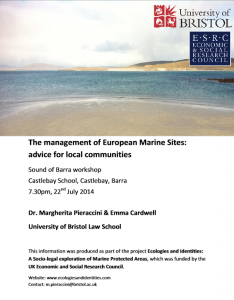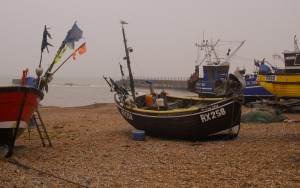Running over two days (24-25 Sept 2015), the symposium invited speakers from both the social sciences and natural sciences considered issues related to Marine Protected Areas within the wider context of marine governance in national and international contexts. Themes such as the relationship between environmental conservation and socio-economics impacts of Marine Protected Areas were discussed through multi-disciplinary lenses, next to key concepts such as “ecological networks” and an “ecosystem-based approach”. Case studies from different MPAs were presented to ground the concepts and themes in empirical evidence. Please see files below with ppt presentations and abstracts.
Margherita Pieraccini: Designating MPAs in the UK: accounting for socioeconomic issues
Tom Appleby: Sirens of the sea? MPA designation on the Isle of Arran
Ruth Brennan: Cultural transformations in the Scottish marine policy process: the story of Barra
Alex Caveen: The controversy over MPAs: science meets policy




